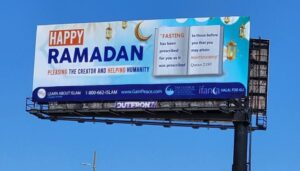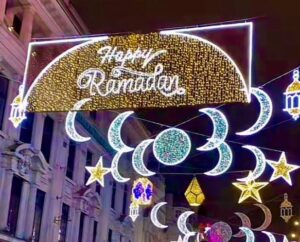Ramadan, the ninth month of the Islamic lunar calendar, means a lot to Muslim faithful across the globe. It is a sacred month in which they engage in fasting as ordained by Allah, the Most High. It is the month in which the Qur’an was revealed. Ramadan comes with more than enough goodies and overflowing blessings for everyone. According to the Prophet of Islam, peace be upon him, in this month, shaytan, the devil and his comrades are held in chains, doors of paradise are left wide open while the doors of hell are shut.
Muslims do not only fast in this month, they also abstain from all ungodly acts, engage in noble deeds and extend hands of love and kindness in abundance to the people around them in a bid to attain the pleasure of Allah (SWT). There is a need to engage in as many good deeds as possible, because the reward for every good act in this month is multiplied in manifolds. Ramadan is indeed a very rare opportunity to easily gain admittance into Jannah (paradise).
In the light of this, Muslims across the globe are always very expectant and ecstatic whenever the month approaches. They look forward to it like a pregnant woman awaits the birth of a new child. They prepare to receive the month in every way possible; stuffing their homes with foodstuff, visiting hospitals for medical check-up and all that may be required to ensure that activities in the month are hitch-free.
Preparations and felicitations get to the climax when Muslims repaint, renovate, refurnish and decorate their homes, mosques, pasting of different signs with inspiring messages, including colourful lanterns known as “fanous” in Arabic, about the month’s abundant magnanimity.
Government in some parts of the world singlehandedly or in partnership with corporate organisations embarks on massive beautification campaigns to decorate cities and fill the atmosphere with the scent of Ramadan, with flowers, banners, posters, lighting and different Islamic symbols within the nooks and crannies of the cities.
Muslims in the Middle East for instance, welcomed the 2023 Ramadan fast with vibrant lights, banners and other themed decors. The authorities in Abu Dhabi, the capital of United Arab Emirates illuminated the cities, including public squares and bridges, with beautiful and captivating messages on the arrival of the blessed month of Ramadan. Qatar, Palestine, Turkiye and Saudi Arabia were not left out in this annual beautification exercise as they also lit up their cities, signalling the beginning of Ramadan!
Interestingly, some of these Middle East countries do similar decorations in honour of the minority groups and expatriates during their festivals, including New Year of the gregorian calendar.
The trend of decorating the cities to welcome the holy month is not only peculiar to the Arabs or Muslim nations as it can be seen for the first time in London, where the famous district of the United Kingdom (UK) capital was decked out with colourful designs and lightning in the shape of the crescent of moon and stars, with the words “Happy Ramadan” erected on Coventry Street between Piccadilly and Leicester Square, to usher in the start of the holy month.

However, the most anticipated month of Ramadan is without the symbolic public decorations and beautification in Nigeria, a country with the largest Muslim population in Africa and the Middle East except the yearly official declaration by their leader, the Sultan of Sokoto, Alhaji Muhammad Abubakar Saad III, to begin fast.
Although, in Nigeria, very few number of Muslims do beautify their homes and offices in simple modest ways to welcome the month of mercy, it is still not a trend that is propagated and embraced among the overwhelming majority, unlike Egypt, another African country, where Ramadan decorations illuminate the streets in different colours, creating a beautiful and magical atmosphere.
This, however, further establishes the age-long mistreatment and partial treatment of Muslims by the Nigerian government at all levels. In Nigeria, government across states and the capital city of Abuja lavishly spend tax-payers money to light up the streets during Christian celebrations and festivities without replicating the same gesture for Muslims during their festivals.
It is noteworthy that ministries, departments and agencies of government as well as corporate organisations do make budgetary provisions for such decorations during Christian festivities, in addition to sponsoring Christmas and New Year parties, while at the informal level, staff are encouraged to contribute towards such festivities.
Lagos State for instance, despite its immense Muslim population, has engaged in Christmas decoration exercise for some years, in partnership with private companies. The state beautifies and lightens up strategic places, including the State House of Assembly, Government House and other public places. Reverse is always the case during Ramadan or Islamic festivals. So, the question on the lips of many Muslims is: why are Muslims being treated like minorities in their states?

Oyo, another Muslim-dominated State in Southwest Nigeria also lightens up streets, corners and roundabouts in celebration of the birth of Jesus, with beautiful Christmas trees in recent times. The people of Oyo feel the vibes and share in the excitement, but no such thing happens during Ramadan, the most cherished month of spiritual reawakening.
In the Christian-dominated Southern part of the country, the authorities do not hide their disdain for Muslims as they publicly spend tax-payers’ money in opulence to promote Christianity, build churches and sponsor the beautification project during Christmas, without such plan for the Muslims during Ramadan or any other festival. It is on record that a former governor of a Southeastern state, earmarked a whopping N600 million to build the tallest Christmas tree ever, while an incumbent governor recently built 8500 capacity worship centre in a South-South state. Sadly, in these states, Muslims aren’t only being marginalised but victimised for identifying with Islam and on many occasions, their modest mosques have been razed by religious bigots or demolished by the prejudiced government.
The private organisations who could have channelled part of their Corporate Social Responsibility (CSR) for Ramadan beautification project, just as they do during the celebration of Christmas; feign ignorance out of sheer hatred for Islam. Zenith Bank Nigeria, through its CSR has in the last 16 years spent hundreds of millions in lightening up the popular Ajose Adeogun in Victoria Island, Lagos for Christmas but it has not embarked on such beautification project for its teeming Muslim customers during their festivals. The only thing the bank does is to formally wish its Muslim customers and their friends “Ramadan Kareem” on a yearly basis.
Muslims might be faulted in terms of their non-embrace of the practice – that is, their non-attachment of importance to many mundane affairs, including beautification of cities to welcome the glorious Ramadan. In this aspect, some exuberant youths might even ignorantly consider it bid’ah (innovation), forgetting they have equal rights like their counterparts in other religions, especially in a multi-religious country like Nigeria. After all, what’s sauce for the goose, they say, is sauce for the gander.
The Church understand this game and they play it a lot to get whatever they want from the government. The rivalry is so obvious that they don’t want Muslims to get what they do get from government. But on the contrary, they always desire what Muslims get or have benefitted, even if it’s not part of their religion. For instance, they also innovated their own Christian Pilgrim Commission in 2007 to compete with the National Hajj Commission of Nigeria, NAHCON, which has been in existence as far back as 1990. While Hajj, the fifth pillar of Islam is a compulsory religious rite for Muslims, the Christian pilgrimage can be likened to a tourism embarked upon to get regular budget and finance from the federal government. In fact, many holy sites they visit in Jerusalem are in Palestine, while in 2022, they included Jordan, another Muslim country, for their pilgrims, due to historical relevance.
Thus, beautification of homes, offices and streets during Ramadan by either government or the private sector is a matter of public interest in guaranteeing equity. Interestingly, the Prophet (SAW) was quoted to have said, “Allah is beautiful and loves beauty”. Historically, Ramadan decorations date back to the early days of Islam. The most recognisable symbols used on most of the Ramadan-related items are the traditional lanterns and crescent. The most significant Ramadan traditions that influenced the Arabs and the world were derived from Egypt.
Beautification for Ramadan is therefore neither a recent phenomenon nor bid’ah (innovation) as some may quickly conclude. According to Arab News in a special report published in 2018, the Saudi Arabia based newspaper wrote: “It is said that lanterns were used during the Fatimid Caliphate at the end of the 10th century and at the beginning of the 11th century.
“History books tell us that during the month of Ramadan in 362 AH, Caliph Al-Muizz Lideenillah Fatimi arrived in Cairo from Morocco. The Egyptians went out in large processions to greet him at night holding torches and decorated colorful lanterns to light the streets. These lanterns remained lit until the end of Ramadan, filling the streets with joy.
“In that connection, Abu Bakr Al-Jassas, a Muslim scholar of the 9th century, in his book “Unanimity of Scholars” stressed that the celebration of festivals (Eids) and the month of Ramadan began in the period during which the Tolonic state was established (i.e. between 868 and 905 AC). According to him, squares were lighted and streets decorated during the month of Ramadan and festivals (Eids).”
It is interesting to note that Nigerian Muslims also had their unique ways of welcoming the arrival of Ramadan. In the Muslim-dominated Southwest, particularly among the Yorubas, it started through “Wéré” which later evolved into Fuji, one of the oldest music genre in Nigeria. Wéré otherwise known as Ere Ajísari, meaning, Songs for waking up for ‘sari’ (the Yoruba word for sahur) was performed by talented youths back in the days to wake Muslims before pre-dawn meal during the Ramadan fasting season. It was popularized by the late Alhaji Sikiru Ayinde Barrister among many others in the 1950s, from which he later conceived Fuji music in the 60s.
So, with the gradual fading of Wéré consequent upon many modern means of waking sleeping Muslims for pre-dawn meal and with the advent of symbolic Ramadan lightings, the Muslim community should therefore adopt the beautification project. Inspiring messages and designs should be displayed in major cities, offices, mosque buildings, among others, and be allowed to remain and change with another captivating Eid celebration, to mark the end of month of fasting.
While calling on the government at all levels to be fair, just, by giving Muslims their dues, the Muslims should also include it as part of their demands and engage private organisations and brands for the acceptability of the initiative which is expected to sustain their relationship.
Muslim News enjoins different Islamic organisations to include in their annual budget, decorations of some major cities in their respective states of operations during Ramadan and the two Eids. Private companies owned by Muslims should also adorn their offices and their environments with crescent, which symbolises the beginning and end of Ramadan with inspiring and beneficial messages.



